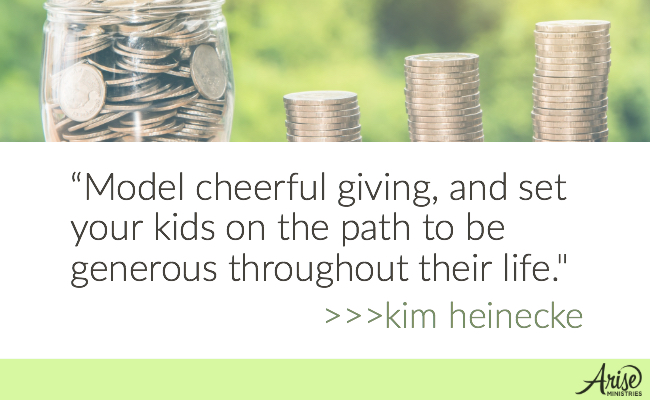Should you offer kids an allowance? There are pros and cons, and even experts disagree. Are my children are entitled to free money for eating the food I purchase, enjoying the air conditioning I provide, and tracking dirt through my kitchen? Based on their facial contortions at dinnertime, my answer is an emphatic, No! Let them settle for my crispy toast and mom jokes as reward.
But what if I allow my kids to earn a small amount of money for the purpose of teaching them the principles of financial stewardship? In our family, an allowance isn’t guaranteed, weekly money. It is money earned for completed age-appropriate, routine chores. The world could certainly use a few more adults who know how to manage their pocketbook.
Begin teaching them early. Letting kids manage a small amount of money can impart valuable lessons for financial literacy.
Lesson 1: The Gift of Work
Before they can get “real jobs,” I believe it’s important for them to develop responsibility and work ethic. The promise of three crisp dollar bills at the end of the week will motivate my eight-year-old to make his bed each day without being asked, feed his fish, and take out the trash. All my boys worked for an allowance. My ten-year-old unloads the dishwasher daily and my eight-year-old helps with vacuuming, for example. When they work for their reward, it builds character and teaches them that diligent effort pays off. They don’t get paid for everything. Some jobs are just part of the responsibility of being a family member. God created work. Even in the perfection of the Garden of Eden, he gave Adam the job to care for it.
Lesson 2: The Importance of Stewardship
Whatever amount they earn, teach them biblical principles of returning a portion to God through the tithe. It’s a more effective tool to have your nine-year-old put a small portion of his money in the offering plate at church than give away the quarter you placed in his pocket on the way inside. Model cheerful giving, and set them on the path to be generous throughout their life. Show them how to practice responsibility by saving some of their money as well. Outside of birthday money or gifts, I’ve always encouraged my sons to put a small amount away for long-term purchases such as a new skateboard for a younger kid or emergencies such as car repairs for teenagers.
Lesson 3: The Responsibility of Independence.
I usually let them choose how to spend their money. I guide them toward wise decisions, but I also let them have a lot of independence. It’s better to learn the consequences of poor financial choices while you’re young than to experiment with money you need for real expenses when you’re older. The more freedom my kids have been given with their earned money, the wiser their choices have become.
Giving kids an allowance lets them practice with money before they leave home. The amount should be modest since the goal is developing money management skills. When kids are old enough to work outside the home, they’ll appreciate the wise lessons learned and be better equipped to handle larger sums of cash. Don’t think of it as giving them money for no reason. Keep the perspective that you are training them to be wise with their finances when they leave home. They’ll thank you for it later.
Proverbs 17:16—Why should fools have money in hand to buy wisdom, when they are not able to understand it?

About Kim Heinecke
Kim Heinecke wants to live in a world where children listen to the advice of their mothers without question. As a former single mom she’s been encouraging women using her life experiences in parenting, growing in the Word of God and everything in between. When she’s not negotiating with a teenager or wrestling a pre-schooler, you can find her camping in the family RV or pretending to understand sports with her husband and four sons. Read more from Kim at www.TheMomExperiment.com.

